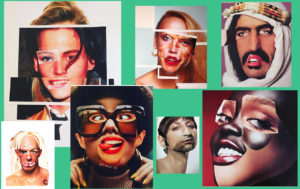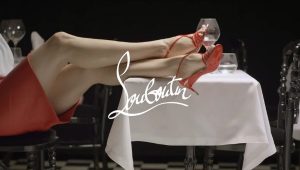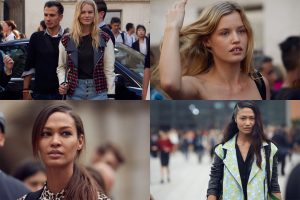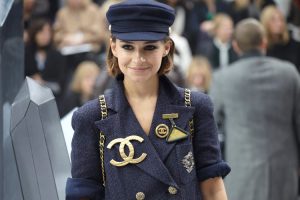“One does not create from perfection. One creates from chaos.”
Our obsessions with accumulating likes and creating the “perfect selfie”, the omnipresence of retouched photos… The way we represent ourselves on digital platforms has redefined the meaning of “looking your best”. But what is beauty in the digital age? Those issues have been at the center of model, data scientist, digital artist and entrepreneur Céline Delaugère’s work.
This fall, she will present NO ONE 991, an exhibition of eight portraits generated by artificial intelligence exploring the interlinking of art, fashion and new technologies. We sat down with her to talk about beauty in the digital age.
Can you tell us about your gallery debut?
NO ONE 9991 came about when I was splitting my time between modeling and studying computer science and mathematics. At the time, I was doing research on artificial intelligence and its image-generating machine learning systems – better known as GAN, or Generative Adversarial Networks – and I wondered what would happen if I combined these tools to the faces of fashion that I rubbed shoulders with every day. Ever since I was very little, I’ve been fascinated by the expression of beauty, and the close link it has with mathematics, more specifically with geometry, which I think helps us apprehend and understand the world. That is what informs my work. I have been working on this project for over two years, focusing on research and technical experimentation. Over time, I’ve managed to create a new type of face, completely generated by artificial intelligence.
We’ve long had a tendency to reason that what differentiates humans from machines is our creativity, and yet, we’re working on the idea of creative machines.
In theory, machines are a tool and a completely governable extension of humans, which are not endowed with creativity. In practice, it is not always easy to program and fully control a machine. It is during this loss of control that, in my opinion, a creative space is established for the machine.
Your work presents close-up photos of distorted faces. Can you explain your creative process?
I’ve created a database of 14,000 images of models’ faces over the past few years, all taken during the shows at the four major Fashion Weeks. I then sorted and cropped the images to focus solely on the faces. I was then able to train GANs to generate faces from the database. Many of the images have glitches. These “mistakes” eventually led to distorted faces that I found to be of a staggeringly beautiful.
This concept of “errors” is especially relevant in the Instagram era. What’s your relationship to the notion of perfection?
For me, the image is a projection of the human, through we obviously only reveal a part of ourselves. I find it logical that it may be appropriated and modified to best serve those who disseminate it. The problem with this false image is that it conceals the entire creative process. Crafting an image usually requires a lot of work. Fashion is the perfect example of this: one rarely shows the hours of hard work spent in designing an image.
Lately, we’ve been returning to a rawer aesthetic in our images. How do you explain this? Are we witnessing a redefinition of beauty?
Absolutely. The technical means that we have at our disposal have become increasingly efficient with the advent of digital technology. I think that the normalization of this overly perfect type of image has helped us love the flaws of the “rougher” images, which connect with our nostalgic unconscious. I find this a good way to capture the public’s imagination. Apart from that, I think beauty comes through imperfection. One does not create from perfection. One creates from “chaos”.
You’ve also launched Eva Engines, a search engine that uses facial recognition to cast models. How does it work?
The brands’ needs have changed, especially with Instagram, new technologies, influencers, stories, digital advertising, and so on. We therefore want to put new technologies, including artificial intelligence, at the service of the fashion industry. My desire is to shape the new generation of models and to position myself between technology, fashion, casting and, broadly speaking, marketing.
By querying specifically for what we’re looking for, do we not shut ourselves off to finding new “faces”?
Indeed. And that’s why the Eva Engines adventure is just beginning. I am fully aware that creation must involve more than mere novelty, but rather a profound change that finds its roots in transformation at the design level. And that is what we intend to implement.
In recent years, films and series have tended to show new technologies – including artificial intelligence – as potential dangers to humanity. What would you say to those who feel threatened by artificial intelligence?
It is only a human tool, which we haven’t yet completely mastered. We shouldn’t be afraid of it, but rather reflect on the consequences that will be brought about by its progress. In my view, it is imperative that measures be put in place to prevent the growing inequalities caused by AI, and, generally speaking, technology. Having access to the use of artificial intelligence comes at a price, and this price could further deepen inequalities, in areas such as health for example, or, more generally, access to knowledge.
Celine Delaugere “NO ONE 991” Paris exhibitions starts on October 11th at The Claw agency.
RSVP: celine.delaugere@gmail.com



